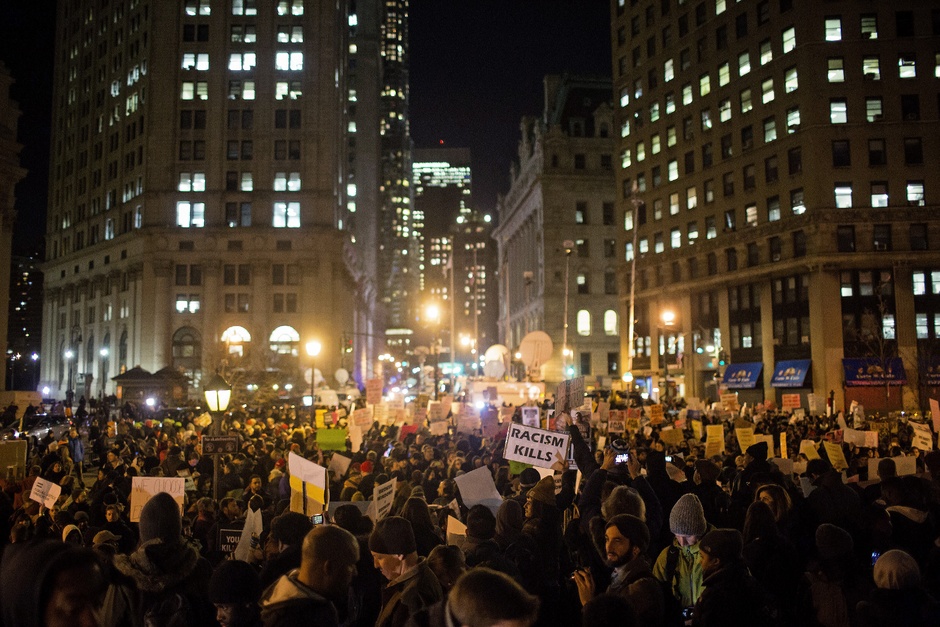Events of the last several weeks have served as poignant reminder (if we really needed one) that race and racial tensions remains a central feature of American social and political life. The deaths of Michael Brown and Eric Garner, and the failure of grand juries in St. Louis and New York to indict the police officers involved, has led to an outpouring of public anger across the United States. This anger has manifested itself on social media, in the streets, at the pulpit, and through the steady stream of commentary on major news networks.
It goes without saying that the Brown and Garner cases have resonance because they illustrate much broader, and deeply troubling, patterns of racialized policing. Young black males are 21 times more likely to be killed by the police than their white counterparts. And this is just the tip of the iceberg: Black men and women are 31 percent more likely to be pulled over while driving. When stopped, they are 3 times more likely to be searched. Nearly 1 in 3 Black males will be incarcerated, versus 1 in 17 while males. On average, Black males receive sentences that are 10 percent longer than their white peers for the same crimes. One could go on and on.
The productive outcome of the Brown and Garner tragedies, if there is one to be had, will be the implementation of reforms that eliminate racial disparities in policing and preserve the lives of young black men. Body cameras, better training, proper prosecutorial oversight of law enforcement, and real community policing are just some of the areas that need to be addressed. Yet reform will require a strong constituency for change. The popular slogan of the moment, “Black lives matter,” must be channeled into a long-term program of action—which will require resources, organization, and commitment. Only by putting sustained pressure on inert American political institutions can the fraught relationship between America’s minorities and the police be improved.
It is here that the African diaspora – and specifically the Eritrean diaspora – must do its part. At the forefront of the recent wave of activism have been African-Americans. The African diaspora, as a distinct but important part of the larger “Black” or “African-American” community, is a logical ally in the effort to combat racialized policing, since they have also been victims of law enforcement’s excessive use of force. Indeed, perhaps the most notorious case of the unwarranted use of lethal force against young black men was the 1999 killing of the unarmed Ahmadou Diallo, who was shot 19 times by the NYPD. Importantly, the 19-year old Diallo was a Guinean immigrant that had arrived in the US just three years prior to his untimely death.
Yet although the African diaspora is not immune to the costs of racialized policing, it has not done enough to contribute to the struggle for social change. Of course, as individuals many have taken part in protests and voiced their opinions via social media, but there has been little organized action by the panoply of African diaspora civil society groups here in the US, and in our view, little sense of ownership on the issue of racialized policing amongst the African diaspora. As an Eritrean diaspora organization, we are well aware of our shortcomings in this regard.
Speaking from an Eritrean perspective, we see two main problems. First, almost all of our “political” energies are devoted to the homeland. It is not a bad thing that we are preoccupied with political trends and activities back in Eritrea; however, this focus should not come at the total expense of issues that matter to our quality of life here in the US. Being Eritrean-Americans means we must be emotionally and socially “present” both within Eritrea and our adopted home.
Second, many of us do not see ourselves as part of the African-American community, but as an entirely different minority group not subject to the biases and inequalities associated with being Black in America. If we are to be honest, one of the major factors fueling this perspective is a misplaced sense of superiority. Often, we view ourselves as “distinct” from our fellow African-Americans, because of our cultural identity, and willingly echo the same tired clichés about race relations in America – specifically in regards to Black “culpability” – that have undermined the Black community for generations. Thus, the African diaspora has not simply been an inactive participant in the struggles against racialized policing; our disassociation from Black issues has led us to become complicit in the perpetuation of injustice.
When a young Eritrean male is approached by law enforcement, more often than not, the distinction between “African-American” and “Eritrean-American” is not drawn. The same patterns of racialized policing that led to the deaths of Mike Brown and Eric Garner could, at some point in the future, lead to the deaths of a Solomon, a Tekle, or an Ibrahim. The sooner we recognize this fact, the greater role we will play in changing existing patterns of racialized policing. Only when “Black lives matter” in America, will Eritrean and African lives fully matter as well.
So, as a young Eritrean in the Diaspora, how can you get involved? Here are a couple of things we suggest.
- Look at the listing on fergusonaction.com/solidarity actions/ for the dates, times and locations of events in your region.
- Follow @ThisStopsToday @FergusonAction and @UrbanCusp on Twitter. Twitter is the best resource for real-time information.
- In Twitter’s search box, enter your city and the word “protest.” Do this any day you would like to be engaged in a protest and want to know if one is occurring in your area.
- Keep up to date on hashtags #ThisStopsToday #ICantBreathe #FergusonAction #NotOneDime #BlackLivesMatter #Ferguson #EricGarner on Facebook and Twitter.
- Tweet or email #FergusonAction and #ThisStopsToday and ask if something has been planned in your local community.
As an organization, we look forward to engaging Eritreans in the diaspora around this issue. #blacklivesmatter


